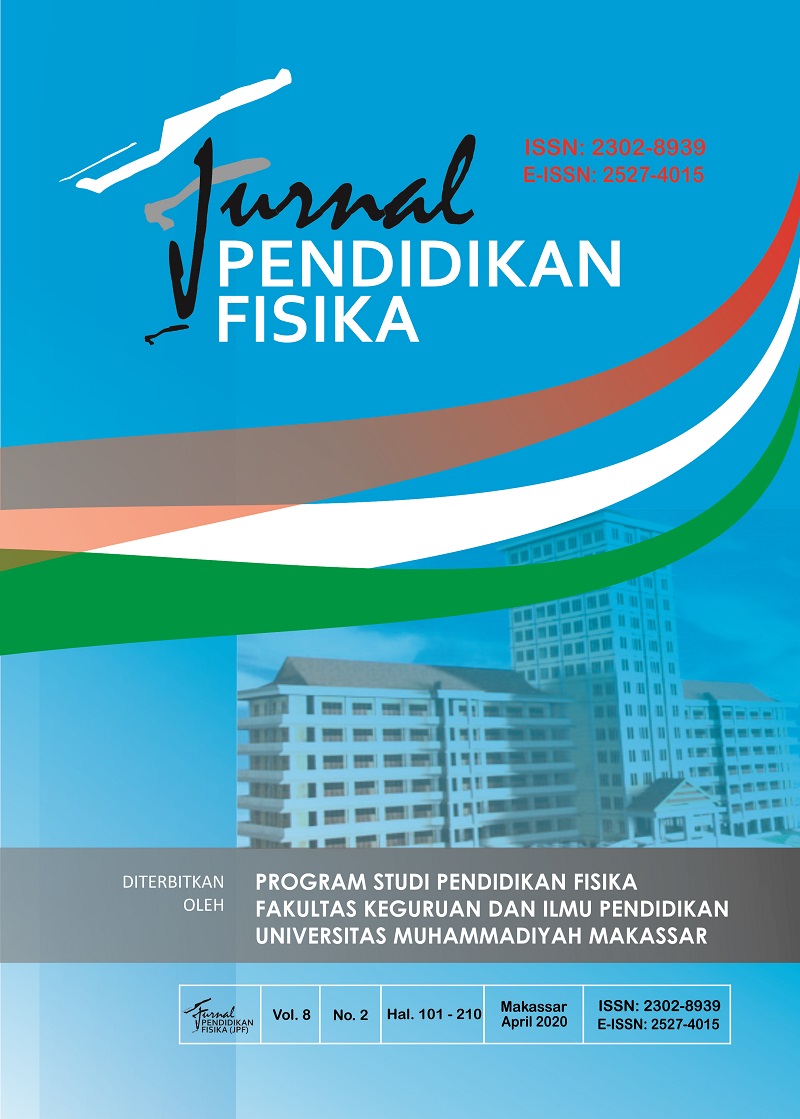The Effect of Guided Discovery Method and Learning Interest on Students' Understanding of Physics Concepts
DOI: https://doi.org/10.26618/jpf.v8i2.3259
Varied Lectures, Guided Discovery Method, Interest in Learning Physics, Understanding Physics Concepts
Abstract
This study aims to analyze differences in understanding of physics concepts between students taught using the guided discovery method with varied lectures, both overall, for high learning interest and for low learning interest. In addition to knowing the interaction between learning methods and learning interest in understanding students' physics concepts. To achieve this goal, an experimental study using a 2 x 2 factorial design was conducted. The population of the study was 193 students of class XI IPA of SMAN 18 Makassar in 2018/2019 Academic Year. The sample subjects of this study were taken through cluster sampling techniques, amounting to 64 people. Two classes as an experimental group were taught using the guided discovery method and two classes as a control class were taught with a varied lecture method. Data were analyzed using descriptive statistics and inferential satelistic two-way ANAVA at a significance level of 5%. The results of the descriptive analysis showed that the average score of understanding the physics concepts of the experimental group students was 18.57 with a standard deviation of 2.53. The average score of understanding the physics concepts of the control group students was 14.56 with a standard deviation of 2.86. The results of inferential analysis show that overall, there are differences in understanding of physical concepts between students taught using the guided discovery method and those taught with varied lectures. Further results, both for high learning interest and those with low learning interest, there are differences in understanding of physics concepts between students taught using the guided discovery method with varied lectures. Finally, the results obtained that there is no interaction between learning methods with interest in learning about understanding students' physics concepts.
References
Qorri’ah, Penggunaan Metode Guided Discovery Learning Untuk Meningkatkan Pemahaman Konsep Pada Pokok Bahasan Bangun Ruang Sisi Lengkung, [online] repository.uinjkt.ac.id/.../100741-QORRI'AH-FITK.P, Jakarta: UIN Syarif Hidayatullah: 19-21, 2011.
Widiadnyana., Sadia., Suastra, Pengaruh Model Discovery Learning Terhadap Pemahaman Konsep IPA dan Sikap Ilmiah Siswa SMA. Journal Program Pascasarjana Universitas Pendidikan Ganesha Program Studi IPA. Volume 4 Tahun 2014, 2014.
Mukhtar & Yamin, Martinus, 10 Kiat Sukses Mengajar di Kelas. Jakarta: PT. Nimas Multima, 2007.
W. S. Winkel, Psikologi Pendidikan. Yogyakarta: Media Abadi, 2007.
N. Sudjana, Penilaian Hasil Proses Belajar Mengajar. Bandung: PT. Remaja Rosdakarya, 2012.
Slameto, Belajar dan Faktor- Faktor yang Mempengaruhinya. Jakarta: Rineka Cipta, 2010.
A. Krapp, Interest, Motivation and Learning: An Educational Psychological Perspective. European Journal of Psychology in Education, Vol 14: 23-40, 1999.
S. B. Djamarah, Psikologi Belajar. Jakarta: Rineka Cipta, 2011.
N. K. Roestiyah, Strategi Belajar Mengajar, Jakarta: PT. Rineka Cipta, 2011.
Nanang & Suhada, Konsep Strategi Pembelajaran. Bandung: Refika Aditama, 2009.
M. S. Khan, Educational Research, New Delhi: APH Publishing Corporation, 2008.
R. A. Sani, K. Arafah, I. Azis, R. Tanjung, H. Suswanto, Evaluasi Proses dan Penilaian Hasil Belajar, Bandung : Rosda Karya, 2020.
Supardi, Aplikasi Statistika dalam Penelitian Konsep Statistika yang Lebih Komprehensif. Jakarta: Change Publication, 2013.
N. Maulidar, Yusrizal, dan A. Halim. Pengaruh Penerepan Model Pembelajaran Guided Discovery Terhadap Kemampuan Pemahaman Konsep dan Keterampilan Berpikir Kritis Siswa SMP Pada Materi Kemagnetan, Jurnal Pendidikan Sains Indonesia, Vol. 04, No.02, hlm 69-75, 2016.
Kardian F Rahmi, Rachmat Sahputra, Rody Putra Sartika, Pengaruh Model Guided Discovery Learning Pada Larutan Penyangga (Buffer) Terhadap Pemahaman Konsep Siswa SMA, Jurnal Pendidikan dan Pembelajaran Khatulistiwa, Vol 4, No 8, 2015.
M. Syah, Psikologi Belajar. Jakarta: Rajawali pers, 2006.
Downloads
Published
How to Cite
Issue
Section
License
Copyright:
Authors who publish with this journal agree to the following terms:
1. Authors retain copyright and grant the journal right of first publication with the work simultaneously licensed under a Creative Commons Attribution-ShareAlike 4.0 International License that allows others to share the work with an acknowledgement of the work's authorship and initial publication in this journal.
2. Authors are able to enter into separate, additional contractual arrangements for the non-exclusive distribution of the journal's published version of the work (e.g., post it to an institutional repository or publish it in a book), with an acknowledgement of its initial publication in this journal.
3. Authors are permitted and encouraged to post their work online (e.g., in institutional repositories or on their website) prior to and during the submission process, as it can lead to productive exchanges, as well as earlier and greater citation of published work.
Licence:
Authors are free to:
1. Share: Copy and redistribute the material in any medium or format
2. Adapt: Remix, transform, and build upon the material for any purpose, even commercially.
The licensor cannot revoke these freedoms as long as the authors follow the license terms, which include the following:
1. Attribution: You must give appropriate credit, provide a link to the license, and indicate if changes were made. You may do so in any reasonable manner, but not in any way that suggests the licensor endorses you or your use.
2. ShareAlike: If you remix, transform, or build upon the material, you must distribute your contributions under the same license as the original.
3. No additional restrictions: You may not apply legal terms or technological measures that legally restrict others from doing anything the license permits.
Jurnal Pendidikan Fisika is licensed under a Creative Commons Attribution-ShareAlike 4.0 International License.






